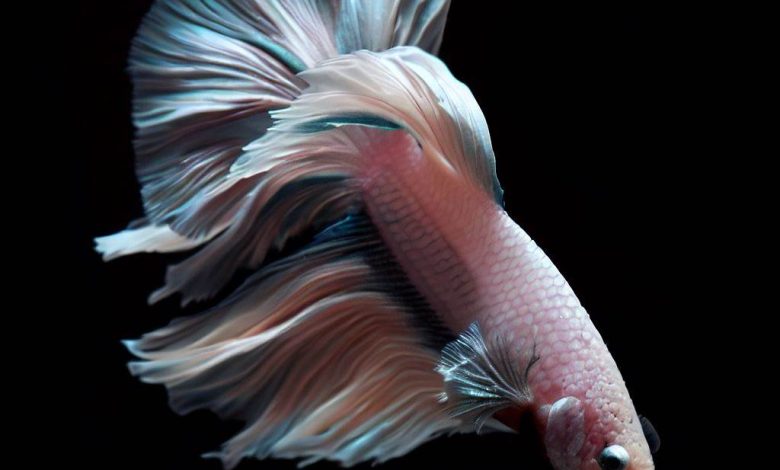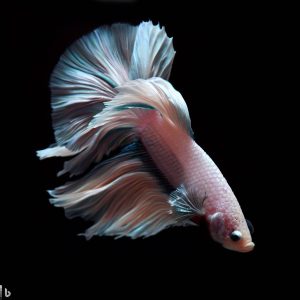Why Is My Betta Fish Turning White?

Hello there, fellow betta fish fans! Are you wondering why your betta fish has recently turned white? Or is the vibrant color of your betta fish gradually fading, leaving them pale and white? Well, Don’t fret! In this article, we’ll explore the fascinating world of betta fish color changes and uncover the reasons why your betta fish is turning white.
Understanding why your betta fish is turning white is crucial for providing the best care and ensuring their overall happiness. So, let’s dive right in and discover the secrets behind the mysterious white betta fish phenomenon!
Why Is My Betta Fish Turning White?
Betta fish come in a wide range of colors and patterns, and it’s perfectly normal for some of them to be white or pale in color. In fact, these striking white bettas can be a true eye-catcher in any tank. So, if your betta fish has always had a pearly white appearance, it’s likely that they were born that way and are simply showing off its natural color variation.

Also, Read
10 Causes of Your Betta Fish’s Whitening?
Natural Color Variations
Did you know that betta fish are like living canvases, capable of showcasing a wide range of genetic color variations? It’s true! Breeding practices and genetics play a significant role in determining the pigmentation of these magnificent creatures.
Some betta fish are selectively bred to display specific colors, while others naturally possess a white or pale shade. So, if your betta fish has suddenly turned white, it might just be their unique way of showing off its genetic splendor. Embrace the beauty of their newfound color and appreciate the marvels of nature!
How Stress Can Turn Betta Fish White
We all know that stress isn’t good for anyone, not even our finned friends. When betta fish encounter stressful situations like inappropriate tank conditions, aggressive tank mates, or sudden environmental changes, their colors can undergo some serious mood swings.
Think of it as their version of having a bad hair day! Stress-related color changes can cause their vibrant hues to fade or even turn white. If your betta fish is feeling a little overwhelmed, it’s crucial to identify and address the stressors to restore its natural color and bring back its inner radiance.
Health Issues that Cause White Discoloration
Sometimes, a betta fish turning white can be a red flag indicating an underlying health issue. Certain diseases and infections, such as fungal infections or parasitic infestations, can cause their colors to fade, leaving them looking pale and washed out.
If you notice other concerning symptoms like lethargy, loss of appetite, or unusual behavior accompanying the color change, it’s important to play it safe and consult a veterinarian experienced in fish care. They can provide a proper diagnosis and recommend the necessary treatment to restore your betta fish’s vibrant hues and overall well-being.
Genetic Factors
Just like humans inherit traits from their parents, betta fish also inherit certain genetic factors that influence their color changes.
The world of betta genetics is as diverse as a coral reef, and it can result in some jaw-dropping transformations! Some betta fish may change color as they age or in response to specific triggers, thanks to the magic hidden within their DNA.
While genetic color changes are completely natural, it’s important to keep an eye on your betta fish’s overall health and well-being alongside any mesmerizing transformations they may undergo.
Aging and Fading Colors
We’re all getting older, even our aquatic buddies! As betta fish gracefully age, it’s not uncommon for their colors to fade or change. Think of it as their way of embracing their golden years with grace.
So, if your betta fish is rocking the white look, it might just be a part of their natural aging process. But don’t worry, they can still radiate beauty in their own unique way. Just continue providing them with the love and care they deserve, and they’ll keep enchanting you with their timeless charm.
Environmental Factors
It’s time to create a cozy and visually appealing haven for your betta fish! The environment inside their tank can greatly influence their coloration. Lighting, for instance, plays a crucial role in showcasing their vibrant hues.
So, make sure to set up appropriate lighting conditions that mimic their natural habitat. Steer clear of excessive or direct sunlight, as it can cause stress and potentially harm their delicate skin.
Additionally, provide plenty of hiding places and decorate their tank with beautiful ornaments to create a comfortable and stimulating environment. By doing so, you’ll enhance their overall well-being and help them show off their true colors.
Water Quality and pH Levels: Impact on Betta Fish Coloration
Picture this: crystal clear waters reflecting vibrant colors. Sounds dreamy, right? Well, it’s not just a fantasy; it’s a crucial aspect of maintaining your betta fish’s stunning hues.
The quality of water and the pH levels in their tank can significantly impact their coloration. Poor water conditions, such as high ammonia or nitrate levels, can stress your betta fish and lead to color fading or whitening.
To keep their colors popping, make sure to regularly test the water parameters, perform routine water changes, and ensure proper filtration. Maintaining the pH levels within the optimal range for betta fish (around 6.5 to 7.5) will also contribute to preserving their radiant beauty.
How Diet Can Affect Betta Fish Color
Believe it or not, the saying “you are what you eat” applies to our underwater pals too! A balanced and nutritious diet is the key to a betta fish’s heart (and color!).
Nutritional deficiencies, particularly in pigments like carotenoids, can lead to a loss of color intensity. So, make sure you’re feeding your betta fish a high-quality diet that includes specialized betta fish pellets or flakes, complemented by occasional treats like freeze-dried or live foods.
By providing them with a varied and nutrient-rich menu, you’ll be helping them maintain their vibrant colors and radiance.
When to Consult a Veterinarian for White Betta Fish:
Sometimes, it’s best to call in the experts when things get a little fishy. While some color changes in betta fish are normal and harmless, certain situations warrant professional assistance.
If your betta fish’s white coloration is accompanied by other concerning symptoms like lethargy, loss of appetite, fin deterioration, or behavioral abnormalities, it’s essential to consult a veterinarian who specializes in fish health.
They can perform a thorough examination, diagnose any underlying health issues, and provide appropriate treatment to restore your betta fish’s color and overall vitality.
Conclusion
Phew! We’ve traveled through the magical realm of betta fish colors and uncovered the reasons behind their white transformations. Whether it’s a natural genetic variation, stress-related discoloration, health issues, or environmental factors, each betta fish has its own unique story to tell.
Embrace the beauty of their color changes, and remember to provide them with a loving and nurturing environment. By understanding the factors that contribute to their coloration, you’ll be able to ensure the well-being and radiance of your betta fish for years to come. Happy betta-keeping!





